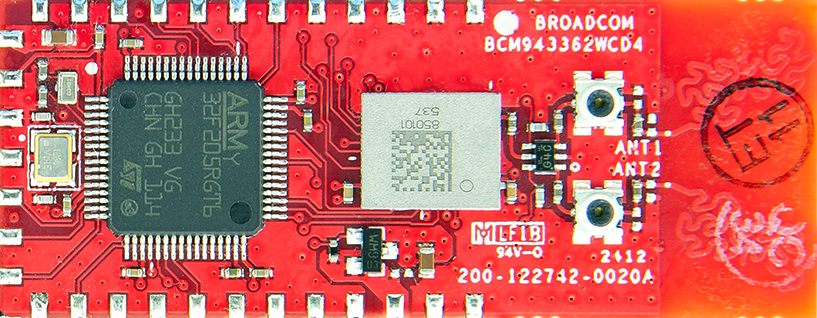WICED -- Wireless Internet Connectivity for Embedded Devices


Broadcom's Wireless Internet Connectivity for Embedded Devices (WICED™) platform (pronounced "wik-id") eases development effort and simplifies the implementation of Internet connectivity in an array of consumer devices, especially those without existing support for networking.
Developers use the WICED platform to create secure wireless networking applications on a wide array of platforms encompassing Broadcom wireless connectivity technologies. The WICED platform encompasses:
- WICED™ Wi-Fi - a development system for Wi-Fi Connectivity
- WICED SMART™ - a development system for Bluetooth Smart (Bluetooth Low Energy) applications

Use the WICED Development System to create secure embedded wireless networking applications on an existing product microcontroller, or on an additional WICED module that includes a microcontroller. Either way, the comprehensive and size-optimized WICED application library and embedded Wi-Fi driver work together with a Broadcom® embedded wireless LAN chip to provide seamless wireless connectivity.
If you need ultra low power wireless, use the included WICED SmartBridge™ API to provide seamless data aggregation and internet connectivity for WICED Smart devices too!
WICED™ Wi-Fi Development Kits
Broadcom provides a WICED Software Development Kit and is working with partners to deliver turnkey hardware solutions to enable Wi-Fi connectivity.
WICED™ Wi-Fi Software Development Kit
The WICED SDK includes
- An open source build system and toolchain based on GNU make (native IAR support coming soon!).
- A GUI Development Environment based on Eclipse CDT that seamlessly integrates with a JTAG programmer and single-step, thread-aware debugger based on OpenOCD and gdb.
- A comprehensive software stack with a choice of several RTOS/TCP stack options includingThreadX/NetX, ThreadX/NetX Duo and FreeRTOS/LwIP.
- Advanced security and networking features such as SSL/TLS, IPv4/IPv6 networking, and mDNS (Bonjour) device discovery.
- Bluetooth Low Energy SmartBridge™ to connect Bluetooth Smart devices to Wi-Fi
- WICED Application Framework including bootloader, flash storage API, over-the-air (OTA) upgrades, factory reset, and system monitor.
- Simple out-of-box device setup using Apple-licensed MFi technology or via a web browser and softAP/webserver.
- Production ready sample applications.
- Lots of application snippets demonstrating how to use the rich WICED API feature set.
- Various test applications to aid manufacturing and certification.
- All documentation included inside the WICED SDK.
The WICED™ Wi-Fi SDK and Documentation can be downloaded here after completing the registration process.
BCM943362WCD4_EVB --- WICED™ Wi-Fi Evaluation Kits

 What is WICED?
What is WICED?- WICED™ is a development system that vastly reduces the effort required to add wireless connectivity to embedded devices.
The SDK enables developers to quickly create network connected applications targeted for low-resource microcontrollers.
 What is included in the WICED™ SDK?
What is included in the WICED™ SDK?The WICED SDK includes :
- An open source build system and toolchain based on GNU make.
- A GUI IDE based on Eclipse CDT that seamlessly integrates with a programmer and single-step, thread-aware, debugger based on OpenOCD and gdb.
- A complete software stack that includes advanced security and networking features such as SSL/TLS, IPv4/IPv6 networking, and mDNS/Bonjour.
- Production ready example applications.
 Which Operating Systems does the SDK run on?
Which Operating Systems does the SDK run on?- The WICED SDK runs on all major operating systems including Windows®, Mac OS X and Linux.
 How much does the SDK cost?
How much does the SDK cost?- The SDK is available free when developing applications on microcontrollers connected to Broadcom Wi-Fi products.
 Which RTOS & Network Stacks are available with the SDK?
Which RTOS & Network Stacks are available with the SDK?- Two options are available: a commercial option which is provided as linkable object files, and an open source option. Both options are free when used with microprocessors connected to a Broadcom Wi-Fi chip. The commercial option, ThreadX/NetXDuo from Express Logic, provides full IPv4 and IPv6 networking functionality. The open source option, FreeRTOS/LwiP only provides IPv4 networking functionality.
 What if I want to use a different RTOS or Network Stack?
What if I want to use a different RTOS or Network Stack?- The WICED™ API abstracts the RTOS & networking stack in an attempt to avoid the need for developers to interact directly with these software components. The abstraction layer is written to minimize the effort required to port to other RTOS & Network Stacks if desired.
 Does the SDK support Wi-Fi Protected Setup (WPS)?
Does the SDK support Wi-Fi Protected Setup (WPS)?- Yes. WPS 1.0 and 2.0 are supported. The WPS supplicant runs on the microcontroller.
 How much Flash and RAM does my application need?
How much Flash and RAM does my application need?- Application resource requirements vary depending on networking and security features required by the application. Most applications require at least 512kB Flash memory and 64-128kB RAM.
 Where do I buy WICED™ evaluation boards?
Where do I buy WICED™ evaluation boards?- WICED™ modules and evaluation boards are available from Broadcom, ODMs and third-party distributors here.
 Does WICED™ support SSL/TLS security?
Does WICED™ support SSL/TLS security?- Yes. WICED™ supports TLS up to version 1.1. Coupled with the included http client and http server modules, WICED™ supports full HTTPS encryption. The SSL/TLS supplicant runs on the microcontroller.
 Which Microcontrollers are supported by the SDK?
Which Microcontrollers are supported by the SDK?- The SDK supports a range of STM32 microprocessors from ST Microelectronics, the SAM4 series from Atmel and Kinetis K60 from Freescale. Support for microprocessors from additional vendors is in progress.
 Does the WICED™ SDK support a SEP2.0 stack?
Does the WICED™ SDK support a SEP2.0 stack?- Yes. A SEP2.0 stack for WICED™ is available from one of Broadcom's partners. Please contact Broadcom sales to obtain further details.
 Does the WICED™ SDK support Wi-Fi Direct?
Does the WICED™ SDK support Wi-Fi Direct?- Yes. The core features of Wi-Fi Direct (softAP, DHCP server and WPS) are available as part of the WICED™ SDK.
 Does the Wi-Fi security supplicant run on the microcontroller?
Does the Wi-Fi security supplicant run on the microcontroller?- No. The Wi-Fi security supplicant runs on the Broadcom Wi-Fi chip.
 Where do I get support?
Where do I get support?- General support for the WICED Development System is available on the WICED forum.
WICED -- Wireless Internet Connectivity for Embedded Devices的更多相关文章
- 论文翻译:2020_Lightweight Online Noise Reduction on Embedded Devices using Hierarchical Recurrent Neural Networks
论文地址:基于分层递归神经网络的嵌入式设备轻量化在线降噪 引用格式:Schröter H, Rosenkranz T, Zobel P, et al. Lightweight Online Noise ...
- WM-N-BM-09 WM-N-BM-14
USI Delivers WICED Module to Gain Great Success Customers Broadcom’s Wireless Internet Connectivity ...
- [转]A Guide To using IMU (Accelerometer and Gyroscope Devices) in Embedded Applications.
原文地址http://www.starlino.com/imu_guide.html Introduction There’s now a FRENCH translation of this art ...
- Smart internet of things services
A method and apparatus enable Internet of Things (IoT) services based on a SMART IoT architecture by ...
- Single-stack real-time operating system for embedded systems
A real time operating system (RTOS) for embedded controllers having limited memory includes a contin ...
- 微软职位内部推荐-SW Engineer II for Embedded System
微软近期Open的职位: Do you have a passion for embedded devices and services?   Does the following m ...
- Methods for Using Message Queuing Telemetry Transport for Sensor Networks to Support Sleeping Devices
Methods support a sleep mode for an embedded device. Embedded devices like sensors and actuators use ...
- 无线电源传输 Wireless Power Consortium (WPC) Communication
Universally Compatible Wireless Power Using the Qi Protocol Wireless charging of portable electronic ...
- Using QEMU for Embedded Systems Development
http://www.opensourceforu.com/2011/06/qemu-for-embedded-systems-development-part-1/ http://www.opens ...
随机推荐
- 26_Python的内置函数
The Python interpreter has a number of functions and types built into it that are always available.P ...
- (正则表达式)linux shell 字符串操作(长度,查找,替换,匹配)详解
在做shell批处理程序时候,经常会涉及到字符串相关操作.有很多命令语句,如:awk,sed都可以做字符串各种操作. 其实shell内置一系列操作符号,可以达到类似效果,大家知道,使用内部操作符会省略 ...
- Python 中的闭包与装饰器
闭包(closure)是函数式编程的重要的语法结构.闭包也是一种组织代码的结构,它同样提高了代码的可重复使用性. 如果在一个内嵌函数里,对在外部函数内(但不是在全局作用域)的变量进行引用,那么内嵌函数 ...
- php 面试指南
https://xianyunyh.gitbooks.io/php-interview/
- 苹果receipt样例
使用[[NSBundle mainBundle] appStoreReceiptURL]方式获取receipt (iOS7及以上获取receipt的方法) 普通付费 "latest_rece ...
- Django的自带认证系统——auth模块
Django自带的用户认证 auth模块 from django.contrib import auth 备注:使用auth模块时,我们默认使用Django提供的auth_user表,创建数据时,可以 ...
- 打开Office2007弹出“向程序发送命令时出现问题” 解决方案
打开Office2007弹出“向程序发送命令时出现问题” 解决方案,试了很多方案,最终还是这种方法帮我解决了问题,分享下,以下地址便是: http://club.excelhome.net/threa ...
- TeX Live & TeXstudio 安装手记
数据库课上又看到了那位用 beamer 做 slides 的师兄,想到自己一拖再拖的LaTeX入门,决定赶快动手装个环境再说~在经过一番搜索和研究之后决定先在 windows 底下试用,选择 TeX ...
- yii2 DateTimePicker显示到天
扩展是 kartik\datetime\DateTimePicker; 关键是加入此配置 'minView'=> "month",示例如下: <?php echo D ...
- XAML实时显示更新插件LiveXAML
XAML实时显示更新插件LiveXAML LiveXAML是Visual Studio的第三方扩展插件.该插件可以从Visual Studio Marketplace下载,也可以从官网下载http: ...
